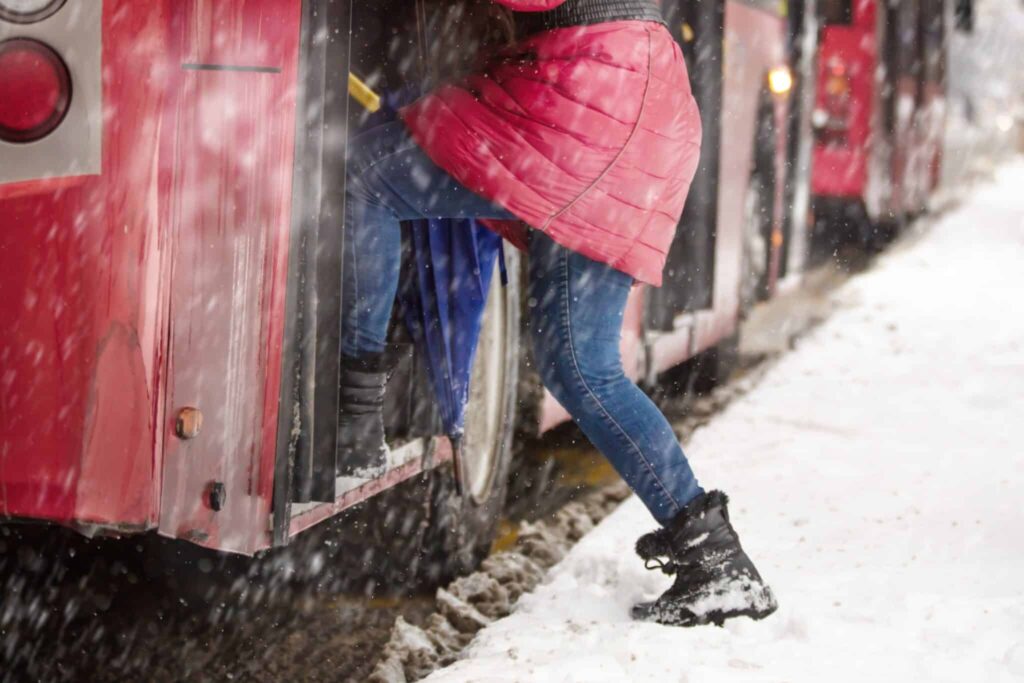Millions of people use public transportation, such as buses or the metro, to get where they need – or want – to be. But what happens if you slip and get injured on a bus? According to a bus safety data report by the U.S. Department of Transportation, slips, trips, falls, electric shocks, and smoke events made up 48% of all bus injuries. These incidents also caused 7% of all bus fatalities between 2008-2016 and increased in frequency per mile for six years straight.
If you slip and fall while using public transportation, you may wonder – can you sue the government? After all, your local state, city, or county operates public transit. Could you sue on behalf of a family member who lost their life because of a slip and fall on a bus? The answer to both questions is yes. Understanding your legal options is vital if you want to obtain the best outcome in a bus accident case.
Common Slip and Fall Injuries on Buses
A slip or fall is no joke. The older you get, the easier it is for a fall to end in broken bones. A fall on a bus can cause spinal or nerve damage, neck injuries, cuts, bruises, muscle strains or tears, knee injuries, dislocated shoulders, hip injuries, or sprained wrists and ankles.
Bus interiors are full of sharp angles, such as hard seats and metal handrails. If you slip or fall, you might collide with multiple surfaces on your way down. Hit your head, and you could wind up with a concussion or traumatic brain injury. Even catching yourself could backfire – you may injure the arm or the shoulder you break your fall with.
It’s not hard to see why so many slip and fall accidents occur on buses. Passengers are often tightly packed together, making it easy for someone to lose their balance and fall if another passenger bumps into them. Accessories, such as luggage, can clutter the floor and worsen falls. Due to rain, snow, or spilled drinks, many buses also have wet, slippery floors that increase the severity of slip and fall accidents.
Other slip and fall dangers include malfunctioning bus doors that don’t open or close properly, loose carpeting, broken handrails, and aggressive bus drivers. A driver who speeds or takes corners too quickly could send passengers tumbling.

How Filing a Lawsuit After a Bus Accident Can Help
Like most people, you probably have a lot on your plate. An injury is the last thing you need when you have things to do and places to be. You may be tempted to brush off your bruises and go on with your day, but it’s important to take your fall seriously.
If you slip and fall on a bus, you may not understand the extent of your injuries immediately. What starts as a slight tweak or ache could worsen as adrenaline fades following the accident. Brain and head injuries are often latent, meaning they’re not immediately obvious. You may not experience symptoms until they worsen weeks or even months after an accident.
Unfortunately, waiting to see a medical professional until symptoms present themselves can make recovering compensation more difficult. Establishing a record of medical treatment is vital if you want to obtain the best outcome in your case.
You may be understandably concerned about the cost of medical care following a slip and fall on a bus. A successful personal injury lawsuit after a bus or public transit accident helps cover any expenses or losses you suffer due to your injuries. Additionally, your attorney may be able to cover medical costs during your case, deferring those expenses until your lawsuit concludes.
Filing a lawsuit for a slip and fall accident can help you get financial compensation for economic and non-economic damages. That includes:
- The cost of medical treatment and long-term care for your injuries;
- Any income or wages you lost as a result of being unable to work;
- Your physical pain, emotional anguish, and mental suffering; and
- Any property damage you suffered (for example, a laptop that broke when you fell).
You shouldn’t be on the hook for injuries caused by someone else. The more severe or permanent your injuries, the more compensation you could get.

Gathering Evidence for a Slip & Fall Lawsuit
You should immediately begin documenting your experience and injuries after an accident. You should:
- Take photographs and videos of the scene of your fall – was the floor wet? Was anything on the bus broken? Were any objects obstructing your path? Evidence proving that your slip and fall was at least partially due to someone else’s negligence is vital.
- Record which bus you’re on, the location you got injured, and the bus driver on shift. If your driver’s behavior played a role in your injury, that information could play a crucial role in your case.
- Gather contact information for anyone who witnessed your fall. Your lawyer can leverage eyewitness statements to help prove that your accident occurred due to someone else’s negligence.
- Get checked out by a medical professional as soon as possible. Detailed medical records are essential for proving the severity of your injuries and what compensation you deserve. Your lawyer can connect you to medical specialists that will provide you with the care you deserve.
At Wilshire Law Firm, your consultation is free, and our attorneys work on a contingency fee basis. That means you don’t pay unless we win your case. We also have doctors on staff who can defer your medical bills until after you’ve won your case.
If a government entity is involved in your injury, you may only have 60 days to file a claim. It’s important to talk to a public bus accident lawyer as soon as possible. Contact us online or via phone at (800) 501-3011 to work with a team dedicated to fighting for your rights.










